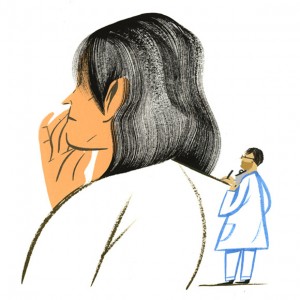
How To Tell Someone That She Is Dying
 Elizabeth’s breast cancer had already spread to her bones and was now invading lymph nodes in her right armpit, causing painful swelling that kept her up at night. Today, however, as she walked into her oncologist’s office, Elizabeth felt like things were under control.
Elizabeth’s breast cancer had already spread to her bones and was now invading lymph nodes in her right armpit, causing painful swelling that kept her up at night. Today, however, as she walked into her oncologist’s office, Elizabeth felt like things were under control.
“All right, so how is your arm?” the oncologist asked.
“Actually, it’s better than it was,” she replied. “I mean, it still hurts. It’s still very swollen.”
The oncologist could see that her arm was getting worse. “I think those lymph nodes have gotten a little bigger, haven’t they?” he asked.
“I think they’re bigger,” he said, as he placed his stethoscope on her chest. “A couple of breaths. Again.”
She exhaled one more time and made her position clear: “I’m still not in favor of chemo. Sorry. I’m not.”
“O.K.”
“I thought about it and … I feel like I would never go back to work. I feel like it would just do me in.”
Frustrated by the denials, the oncologist let his emotions get the best of him. “How about if this sucker is going to go and do you in?” he asked. “That’s going to happen, too. That’s the problem. It’s going to grow and kill you.”
This clinical encounter was audio recorded, in 2012, by a company called Verilogue, which conducts marketing research for the pharmaceutical industry. The conversation struck me as emblematic of the challenge that physicians face practicing medicine in an era of empowered patients. As recently as the nineteen-seventies, medical decision-making in the United States was largely a doctor-knows-best endeavor…
(Continue reading on The New Yorker)
Don't Cry for Me, Doctor Tina?
 Okay, worst blog post title of the year. But just trying to grab your attention and point you towards a nice USA Today article on doctors and emotional intelligence.
Okay, worst blog post title of the year. But just trying to grab your attention and point you towards a nice USA Today article on doctors and emotional intelligence.
“Tamir Mosharrafa, a plastic surgeon in Phoenix, recalls the 20-something woman who came in for liposuction. “Dani” was very lean and very pretty – and “absolutely not a candidate” for the procedure, Mosharrafa says. She’d come to his office with her mother, and Mosharrafa asked to speak to Dani alone. “I asked her, ‘Dani, what brought you here today – because it’s clearly not your physical appearance?’”
That question promoted Dani to open up about how she was chided as a middle-school student for being a little overweight. That trauma was still with her, and she cried revealing it to her doctor. “That’s where getting emotionally connected can make a difference,” Mosharrafa says.
He didn’t perform liposuction on Dani, instead referring her to someone who could discuss more at length the real source of her troubles.
Mosharrafa’s patients run the gamut of breast cancer patients who have undergone mastectomies to women who want bigger or smaller breasts. Behind all these patients are life stories and emotions that he has to learn as he learns about their bodies. “It’s impossible to operate on a perfect stranger,” he says. “In order to do it well – whether it’s making them more beautiful, or making them more whole – you really have to have an understanding of their fears and hopes.””…
(Continue reading here.)
